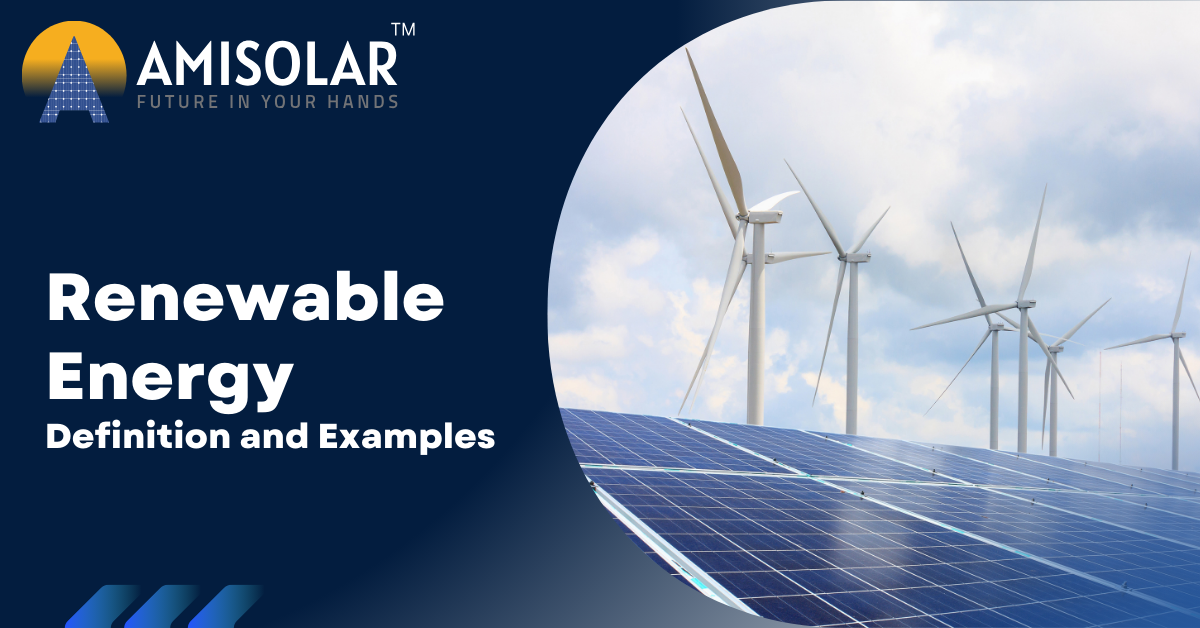As energy prices rise and concerns over the environment grow, many homeowners are turning to…

In today’s world, the quest for sustainable energy sources has become more crucial than ever. As concerns over climate change and environmental degradation continue to mount, the spotlight has increasingly turned towards renewable energy. But what exactly is renewable energy, and why is it so important?
Defining Renewable Energy
Renewable energy refers to energy derived from naturally replenishing resources that are virtually inexhaustible on a human timescale. Unlike fossil fuels, which are finite and contribute significantly to greenhouse gas emissions when burned, renewable energy sources can be continuously replenished through natural processes. This characteristic makes them a cornerstone of sustainable energy solutions.
Examples of Renewable Energy Sources
Solar Energy: Perhaps the most recognizable form of renewable energy, solar power is generated by harnessing sunlight using photovoltaic cells or solar thermal collectors. This energy can be converted into electricity or used directly for heating and lighting.
Wind Energy: Wind turbines convert the kinetic energy of wind into mechanical power, which is then transformed into electricity. Wind farms, both onshore and offshore, have become increasingly common sights as technology has advanced.
Hydroelectric Power: This involves harnessing the energy of flowing water, typically from rivers or dams, to generate electricity. It is one of the oldest forms of renewable energy and continues to be a reliable source of power in many regions.
Geothermal Energy: Geothermal energy utilizes heat from beneath the Earth’s surface to generate electricity or provide heating and cooling directly. This energy is sourced from the natural heat of the Earth, making it highly sustainable.
Biomass Energy: Biomass refers to organic materials such as wood, agricultural residues, and even municipal solid waste that can be burned or converted into biofuels to produce heat or electricity. It represents a renewable alternative to fossil fuels in many applications.
Benefits of Renewable Energy
The adoption of renewable energy offers numerous benefits beyond environmental sustainability:
Reduced Greenhouse Gas Emissions: Unlike fossil fuels, renewable energy sources produce little to no greenhouse gas emissions during operation, helping to mitigate climate change.
Energy Security: By diversifying energy sources, countries can reduce dependence on imported fossil fuels, enhancing energy security and stability.
Job Creation: The renewable energy sector is a significant source of employment, supporting jobs in manufacturing, installation, maintenance, and research.
Cost Competitiveness: Advances in technology and economies of scale have driven down the cost of renewable energy, making it increasingly competitive with conventional energy sources.
Challenges and Considerations
While renewable energy holds immense promise, it is not without challenges:
Intermittency: Some renewable sources like solar and wind can be intermittent, meaning they depend on weather conditions. Energy storage and grid management are crucial for overcoming this challenge.
Infrastructure Requirements: Developing renewable energy infrastructure requires substantial investment and planning, particularly for large-scale projects like wind farms or hydroelectric dams.
Policy and Regulatory Support: Government policies and incentives play a crucial role in accelerating the adoption of renewable energy and creating a level playing field with fossil fuels.
Frequently Asked Questions
What is renewable energy?
Renewable energy refers to energy derived from naturally replenishing sources that are sustainably harvested over short periods, such as sunlight, wind, rain, tides, waves, and geothermal heat.
Why is renewable energy important?
Renewable energy is important because it reduces reliance on finite fossil fuels, lowers greenhouse gas emissions, promotes energy independence, and enhances energy security.
How does renewable energy benefit the environment?
Renewable energy sources produce minimal greenhouse gas emissions compared to fossil fuels, thereby mitigating climate change, improving air quality, and conserving natural resources.
What are the challenges of using renewable energy?
Challenges include intermittency (variability in sources like wind and solar), high initial costs of infrastructure, and the need for grid modernization and energy storage solutions.
How can businesses and individuals benefit from renewable energy?
Businesses and individuals can benefit from renewable energy through cost savings on energy bills, access to government incentives and tax credits, enhanced corporate social responsibility, and improved energy resilience.
What role does innovation play in renewable energy?
Innovation drives advancements in renewable energy technologies, making them more efficient, affordable, and accessible. Innovations also spur economic growth and job creation in the renewable energy sector.
What is the future outlook for renewable energy?
The future of renewable energy looks promising with ongoing technological advancements, declining costs, and increasing global commitments to combat climate change. Renewable energy is expected to play a pivotal role in sustainable development worldwide.
Conclusion
In conclusion, renewable energy represents a pivotal solution in addressing the dual challenges of energy sustainability and climate change. By tapping into the natural resources available to us responsibly, we can pave the way towards a cleaner, more sustainable energy future for generations to come.


